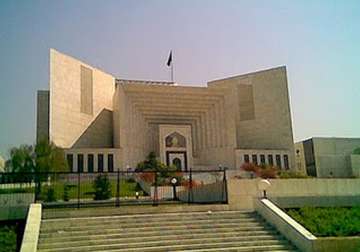New York, Jan 23: As the power struggle continues between Pakistan's civil government and its military, its Supreme Court has become an “arena for lurid political theatre,” resulting in a “titanic” three-way struggle that could damage Pakistan's fragile democracy, the New York Times said.
“Once they were heroes, cloaked justices at the vanguard of a powerful revolt against military rule in Pakistan, buoyed by pugnacious lawyers and an adoring public.
“But now Pakistan's Supreme Court is waging a campaign of judicial activism that has pitted it against an elected civilian government, in a legal fight that many Pakistanis fear could damage their fragile democracy and open the door to a fresh military intervention,” it said.
The report said the judges are not elected representatives of the people and they are arrogating power to themselves as if they are the only sanctimonious institution in the country.
“All dictators fall prey to this psyche - that only we are clean, and capable of doing the right thing”.
In recent weeks, the Supreme court has taken interventionism to a new level, “inserting itself as the third player in a bruising confrontation between military and civilian leaders at a time when Pakistan - and the US - urgently needs stability in Islamabad to face a dizzying array of threats.
“The Supreme Court summoned Prime Minister Yousuf Raza Gilani to testify in court on why no action has been taken on high-profile corruption cases, including those against President Asif Ali Zardari.
“It has also begun an inquiry into the Memogate scandal that cost Pakistan's ambassador to the United States his job and now threatens other senior figures in the civilian government”, the report said.
The fact that the courts have become the arena for such lurid political theatre has reignited criticism, some from once-staunch allies, that the Supreme Court is worryingly overstepping its mark,” the NYT report said.
“In the long run this is a very dangerous trend,” said Muneer Malik, a former president of the Supreme Court Bar Association.
The “titanic three-way struggle” among generals, judges and politicians comes at a time when Pakistan has become increasingly chaotic, the report added.
Pakistan's problems have been compounded by the fact that Taliban insurgents continue to roam the northwest, its economy is in a bad shape and urgently needed reforms in education, health and other social sectors have been largely ignored.
“In the midst of this institutional wrangling, nobody has a clear plan as to how politics or foreign policy are going to move forward,” said Paula Newberg of Georgetown University, who has written a book about Pakistani constitutional politics.
“Pakistan could easily have a much brighter future. But it gets itself worn down by these incessant disputes about where power lies”.
Latest World News
